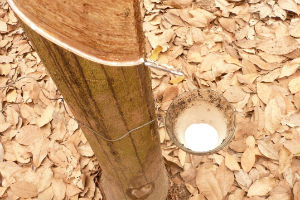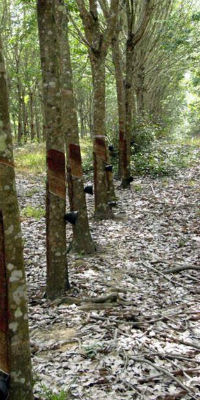 How can family plantations adapt to global climate change?
How can family plantations adapt to global climate change?
Tropical tree plantations, most of which are run by small plantation owners and provide most of the rubber production, supplying renewable goods that are essential to meet worldwide demand. To ensure that the plantations are sustainable, the environmental and socioeconomic conditions must remain favourable for several decades. How can these conditions be guaranteed in a changing environment ?
Although it is difficult to estimate the local consequences of global warming, it is probable that the farmers will have to deal with a more variable climate. Furthermore, all natural resources are subject to price fluctuations depending on world demand. High prices attract new investors and encourage the expansion of plantations into new areas, generating risks and competition.
Aims and research strategy
Analyse how family plantations can adapt and remain viable in the face of variable climatic conditions and major socioeconomic change. How do farmers perceive the risks and what adaptation strategies are they implementing ?
 Rubber plantations in Thailand will be used as a model for tropical family plantations in a globalised agro-industrial business. The project will be concerned with the particular characteristics of rubber trees and the general nature of the rubber tree plantations. The originality of the project is its multidisciplinary approach both for characterising biophysical and socioeconomic changes and for assessing their consequences on the plantations and the risks for the planters. Biology and soil sciences will be associated with social sciences and economics. It will analyse how the interactions between biophysical and socioeconomic factors determine the planters’ response strategies. This will require the identification of pertinent indicators to measure the extent to which farmers adapt and the impact of changes on the sustainability of the systems
Rubber plantations in Thailand will be used as a model for tropical family plantations in a globalised agro-industrial business. The project will be concerned with the particular characteristics of rubber trees and the general nature of the rubber tree plantations. The originality of the project is its multidisciplinary approach both for characterising biophysical and socioeconomic changes and for assessing their consequences on the plantations and the risks for the planters. Biology and soil sciences will be associated with social sciences and economics. It will analyse how the interactions between biophysical and socioeconomic factors determine the planters’ response strategies. This will require the identification of pertinent indicators to measure the extent to which farmers adapt and the impact of changes on the sustainability of the systems
The Sustainable Rural Livelihoods framework (Ellis, 2000) will be used together with the OECD classification of type of risk (2009). A methodology will be proposed to assess the vulnerability and evaluate the potential viability of family businesses. The main biophysical risks are associated with climate change and the expansion of plantations into new, more difficult zones. The risks will be assessed from plot scale to basin scale in terms of soil sustainability (preservation of soil fertility linked to the physical properties and functional biodiversity of the soils) and how trees adapt to water stress.
The specific ecological constraints associated with the different growing areas will be considered. In the expansion zone to the NE, the climate is dryer and the soil fertility is lower, whereas in the conventional zone (S) rubber trees have been cultivated as a monocrop for more than 50 years. In the north, the particular issue is setting up plantations in mountainous regions with a high risk of erosion. A classification of the plantations and cropping systems will be produced based on socioeconomic surveys, focusing in particular on soil management systems and harvesting latex.
The impact of practices on economic performance and the physical state of the soils and their bio-functioning will be assessed using specific indicators developed or adapted in order to provide a multi-criteria evaluation for plantation systems. In addition to determining the specific characteristics of rubber plantations, this study will define indicators that are most appropriate for evaluating the long-term adaptation capacity and viability of family plantation systems.
The thesis of Alexis Thoumazeau is carried out within the framework of this project
Date
2014 - 2017
Partners
- CIRAD, UPR Systèmes de Pérennes
- SupAgro, CIRAD, UMR Innovations
- SupAgro, CIRAD, INRA, CIHEAM, UMR MOISA
- UPMC, UPEC, Paris Diderot, CNRS, IRD, INRA, UMR iEES
- Asian Insitute of Technology, Bangkok, Thailand
- HRPP Platform Thailand
- LUSES joint International laboratory
Funding
ANR
Contact
Philippe Thaler, Eco&Sols, CIRAD Thaïlande
e-mail :






